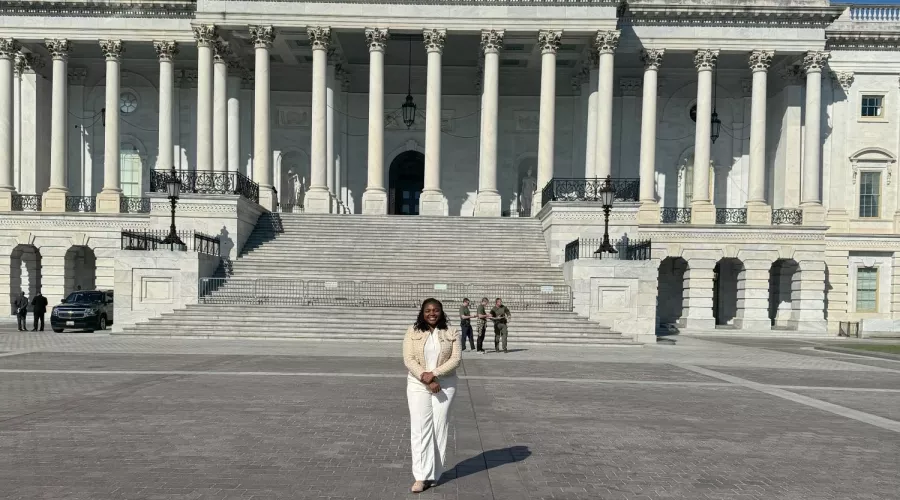UofL medical student advocates for equitable health care
November 4, 2024
The Centers for Disease Control (CDC) defines health disparities as preventable differences in the burden of disease, injury, violence, or opportunities to achieve optimal health. Resulting from multiple factors, including poverty, environmental threats, among others, health disparities are related to unequal distribution of social, political, economic, and environmental resources.
UofL News talked with fourth-year UofL medical student Sierra Shockley about her commitment to addressing health disparities as a Health and Social Justice Scholar (HSJS). Recently selected by the American Lung Association to represent the organization at Respiratory Advocacy Day in Washington, D.C., Shockley met with legislators to address disparities in lung health. Her ongoing advocacy work as a HSJS gave her the chance to not only represent the American Lung Association, but also the University of Louisville.
UofL News: Tell us about your involvement with the Health and Social Justice Scholar (HSJS) program.
Shockley: The mission of this program focuses on addressing health care disparities and promoting equity within underserved populations, which aligns perfectly with my deep-rooted commitment to give back to every community I have the privilege of serving.
What truly excites me about this program is its emphasis on interdisciplinary collaboration, fostering partnerships between students from various professional and doctoral programs, all working together to tackle the most pressing health inequities. Participating in this program has also challenged me to reflect on my role as a future physician, not just in treating patients but in advocating for systemic change.
UofL News: Why is it so important to address health disparities?
Shockley: Health disparities are not just medical problems—they are societal and reflect deep-rooted inequalities that need to be confronted if we are to create a more just and equitable health care system. It’s about making sure that healthcare is fair and accessible to all, no matter where people live or who they are.
It’s a stark reality that something as simple as a zip code can determine a person’s health outcomes, with life expectancy sometimes varying by more than ten years within just a 20-30-mile locational difference. This geographic inequality is just one example of how pervasive and alarming health disparities are. For instance, people of certain racial or ethnic backgrounds are more likely to face higher rates of morbidity and mortality for conditions such as diabetes, hypertension, and asthma, simply because of the systemic barriers that exist in their communities.
UofL Health: How can health equity be advanced through community participatory research?
Shockley: Community-based participatory research (CBPR) involves engaging the communities affected by health disparities in every step of the process, from identifying the problems to developing solutions. CBPR allows for a more inclusive and comprehensive approach to tackling disparities, creating interventions that are both culturally relevant and practically applicable. This approach also helps ensure that the research is actionable, impactful, and sustainable while fostering a sense of trust and ownership within the community as they see that their voices and lived experiences are being valued in the research process.
UofL News: Tell me about your experience in Washington D.C. What was your biggest takeaway?
Shockley: My experience standing for the University of Louisville in Washington D.C. was both inspiring and transformative. The biggest takeaway was the profound impact that storytelling and personal narratives can have when advocating for change. While data and research are crucial, it’s often the emotional and human aspects of a story that resonate most with lawmakers.
This experience also highlighted the power of collaboration—whether it’s with fellow advocates, policymakers, or health care professionals. By working together, we were able to amplify our voices and drive home the importance of lung health on a broader scale.
UofL News: How do you plan to use your research/knowledge about health disparities in your medical career/practice?
Shockley: I am fortunate to be working with Dr. Scott Bickel and Dr. Rose Hawkins on a project analyzing the impact of urban greening on asthma exacerbations and related health outcomes. By studying how urban green spaces can mitigate asthma symptoms and improve respiratory health, I am gaining valuable insight into how environmental justice is tied to health equity, and this knowledge will undoubtedly influence how I approach patient care.
As a future surgeon, knowing many underserved communities face significant barriers to accessing surgical care, I hope to focus part of my career on bridging that gap. Whether through global health initiatives, public health programs, or working with underserved populations locally, I aim to be an advocate for systemic change, ensuring that the communities I serve have access to the resources and infrastructure necessary to lead healthier lives.
Related News




